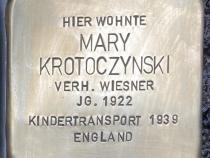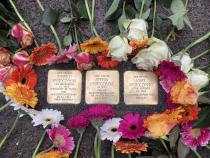Mary Wiesner, née Krotoczynski, was born on July 28,1922 in Friedland, Mecklenburg. Her father, Stefan Krotoczynski, was a tailor and also served as a cantor in Neubrandenburg, a nearby town. Her mother, Gertrud Silberstein, came to Friedland to marry Stefan in 1920. After living in Friedland for six years, her family moved to Strasburg for a year to stay with her grandmother and her father’s sisters.
In 1930, when the family made another move to Berlin, Mary attended public school for two years. After she was expelled for being Jewish, she was admitted to the Jewish Girls School from which she graduated in 1937. Although she was an excellent student, there were no opportunities for her to continue her education in Germany because of the widespread persecution of Jews that curtailed access to education for Jewish children. In 1938, she was injured from a beating by Nazi thugs on her way to school. After her family’s visa application to America was denied, her parents arranged for her to leave Germany on the Kindertransport that left on May 5, 1939. She went to live with a Jewish family in London, acquaintances of her father who had lived in England before World War I. Mary and her foster family were evacuated to the countryside in 1940 due to the bombardment of London. She was admitted to the Nurses Training School in Savernake Hospital in Marlborough, Wiltshire. In Spring 1941, her father died after being severely beaten up by Nazi militia. During that period in 1941, she also lost all contact with her mother and aunts who had been deported, and as a result, she suffered from severe depression.
She recovered to complete her nurses training in Oxford and tried to move on with her life. In 1944, she met Denis Horne, a student at Oxford, and gave birth to a son, Peter, in 1945. She left Denis Horne and met Heinz Wiesner, a German prisoner of War, and returned to Berlin with her son in 1947 to marry him. There, she gave birth to her daughter, Monika, at the Jewish Hospital, Berlin. In 1951, she and her family left East Berlin for West Berlin, with the intention of immigrating to the United States. After obtaining a divorce from her husband in 1953, she left for the United States with her two children to settle in Santa Monica, California, where she joined relatives who had escaped from Germany before the war. Mary continued to work in the health field until her retirement. She died in 1991.
During much of her adult life, Mary struggled with bipolar disorder. The murders of her mother and other family members by the Nazis weighed heavily on her. Although she embraced the joys of life with enthusiasm, she was not able to move beyond the loss of her family and country. To tell her story, she wrote a memoir describing her struggles as a refugee in Germany, England, and the United States. She left behind numerous documents, including wartime correspondence, documenting her communications with her parents before they died. These were compiled by her son to publish the memoir, Bipolar Refugee: A Saga of Survival and Resilience, about the impact of the Holocaust on her and her family.
Mary’s direct descendants in America include her two children, Peter Wiesner and Monika Huntley, as well as four grandchildren and five great grandchildren.




